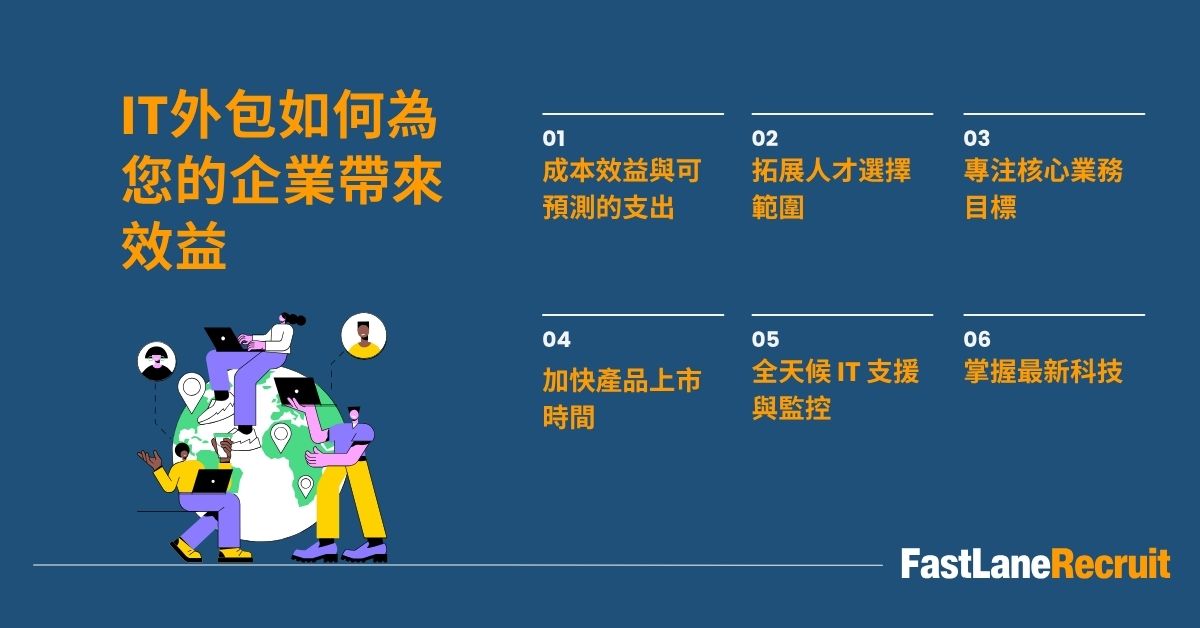科技正持續改變企業的營運模式,無論是自動化日常工作,還是提升客戶體驗,影響深遠。然而,對於香港不少企業,尤其是初創公司及中小企而言,維持一個強大而完善的內部 IT 團隊,往往在財政及營運上都構成不少壓力。在這種情況下,「IT 外包」成為一個具策略性的解決方案,讓企業無需聘請全職 IT 團隊,亦可獲取世界級的技術支援。
根據香港生產力促進局(HKPC)的報告,數碼轉型已成為企業維持競爭力的關鍵。透過外包 IT 功能,企業可受惠於專業技術知識、降低營運成本,以及加強業務靈活性。本文將深入探討香港企業在考慮 IT 外包時需要了解的重點,包括最佳實踐、潛在風險,以及為何大馬 IT 專才成為熱門之選。
內容大綱
重點摘要
IT 外包不僅是削減成本的手段,更是一項策略優勢,有助香港企業加快擴展、推動創新,並專注於核心業務。
鑑於香港人才成本高昂、IT 勞動力短缺,對中小企及初創企業而言,外包成為實現數碼轉型的高效方案。
了解何時應考慮外包至關重要:例如企業正處於快速增長階段、欠缺內部技術能力、IT 問題頻繁,或正籌備推出數碼產品時,皆是合適時機。
外包夥伴可提供靈活支援、專業技術及地區洞察,尤其適合有意開拓新市場的企業。
馬來西亞 IT 專才具備專業技能、成本效益、英語流利,並與香港處於相近時區,是極具吸引力的選擇。
審慎盡職調查不可或缺,應評估供應商的技術能力、資訊安全合規性(包括 PDPO)、文化契合度及擴展能力。
IT 網絡安全工作亦可透過外包完成,惟須確保合作夥伴採用安全協定,並符合香港的私隱法例要求。
永捷人才招聘協助香港企業快速連繫具備遠端協作經驗及項目交付能力的馬來西亞 IT 專才,簡化人才招募流程。
IT外包如何為您的企業帶來效益

IT外包不再僅僅是節省成本的手段,而已發展成推動企業提升敏捷性、創新能力及韌性的策略工具。對於香港這類競爭激烈的經濟體而言,企業需不斷適應數碼化趨勢及應對上升的營運成本,IT服務外包正正提供一條實在可行的轉型之路。以下為幾項最具吸引力且切合本地市場的好處:
1. 成本效益與可預測的支出
香港一直是全球營運成本最高的城市之一,尤其在薪酬及辦公室租金方面尤為顯著。根據香港政府統計處的資料,隨着市場對IT人才(如軟件工程師、網絡安全分析師及系統架構師)需求持續上升,加上人才供應有限,相關職位的薪酬水平於過去十年穩步上升。
延伸閱讀:為何香港公司選擇聘用海外人手?
透過外包IT職能,企業可:
- 避免招聘及挽留高端人才(如DevOps工程師或網絡安全專家)所需的高昂成本;
- 將原本固定的IT支出(如全職人手、設備及辦公室空間)轉化為按需計費的變動成本;
- 減少基礎設施投資,因為外包服務通常已涵蓋雲端主機、硬件維護及授權費用等項目。
這種成本可預測性,對於預算緊絀或仍處於早期成長階段的中小企及初創公司尤為重要。
2. 拓展人才選擇範圍
香港正面臨日益嚴重的 IT 人才短缺,不少企業在本地招聘時屢遇困難。人工智能、數據分析、區塊鏈及網絡安全等職位的需求遠超供應,許多中小型企業更難以在激烈的人才競爭中脫穎而出。
透過外包,企業可靈活調配全球人才資源,聘用來自馬來西亞、越南或印度等地的專業人員。這些地區在 IT 教育與專業培訓方面具備完善制度,而人力成本亦相對具競爭力。例如,馬來西亞 IT 專才具備以下優勢:
- 良好的英語及普通話能力,方便跨地域溝通;
- 熟悉國際科技標準及敏捷開發流程;
- 擅長雲端平台、流動應用及企業系統開發。
透過擴大招聘視野,企業能以更具成本效益的方式接觸到優質人才,同時維持創新水平與服務質素。
3. 專注核心業務目標
將 IT 需求外包,能讓公司內部團隊專注於策略性優先事項,而不必因日常維護或技術故障而分散精力。透過有效分工,團隊可集中資源於以下方面:
- 業務拓展
- 客戶開發及維繫
- 產品與服務創新
- 開拓新市場
此安排有助企業善用最寶貴的人力資源,確保團隊專注於最能創造價值的領域。
4. 加快產品上市時間
若以內部團隊開發應用程式、軟件平台或推動數碼轉型,往往需時甚長且成本高昂。而外包 IT 團隊則具備以下優勢:
- 採用敏捷開發(Agile Sprint)方式
- 應用現成框架加快流程
- 擁有跨行業經驗
- 熟悉 DevOps 和品質保證最佳實踐
這些專業能力可大幅縮短開發週期,讓企業更快速、高效地推出產品與功能,在香港競爭激烈的零售、金融與科技市場中爭取先機。
對初創企業或正進行數碼轉型的公司而言,快速迭代能力對於測試市場反應與即時回應客戶意見至關重要。
5. 全天候 IT 支援與監控
在現今這個「永遠在線」的經濟環境下,系統停機不僅帶來不便,更可能造成業務損失。電子商務平台、流動應用程式及數碼支付系統對系統穩定性有極高要求。透過不同行時區的外包 IT 團隊支援,企業可獲得:
- 24/7 網絡及系統監控
- 即時事故回應與修復
- 持續的效能優化
上述安排有助於在問題影響最終用戶之前即時發現並處理,確保業務運作不中斷,並維持品牌信譽。此舉對以下類型的企業尤其有利:
- 擁有國際客戶的公司
- 採用遙距或混合工作模式的團隊
- 需要達致高運作穩定性的 B2B 平台
6. 掌握最新科技
IT 外包服務供應商往往緊貼新興技術發展,例如雲端運算、人工智能(AI)、機器學習、自動化流程(RPA)及區塊鏈等。對於香港企業而言,若要在內部導入這些技術,往往涉及可觀的資本投入及培訓成本。
外包夥伴則可將這些技術作為服務模式的一部分提供,協助企業:
- 更快速及具成本效益地導入先進 IT 解決方案
- 減低初期投資風險,靈活測試創新技術
- 透過持續的技術現代化,保持行業競爭優勢
總結而言,IT 外包為正面對人才短缺、營運成本上升及科技轉型壓力的香港企業帶來顯著優勢。從降低營運開支、提升技術實力,以至加快創新步伐,外包 IT 功能為企業在數碼經濟中提供更大彈性與專業支援,有助於推動業務持續發展。
何時應考慮外包 IT 功能
了解外包 IT 的戰略優勢固然重要,但掌握正確的時機同樣關鍵。若能在合適的時候啟動 IT 外包安排,企業便能獲得最大的成本效益、營運靈活性及投資回報。以下是一些常見的業務情境,尤其是在節奏急速的香港商業環境中,往往預示著是時候考慮 IT 外包:
1. 欠缺內部技術專才
香港不少中小企及初創公司團隊規模精簡,主要集中於銷售、營運及財務等核心職能。然而,DevOps 工程師、雲端架構師、網絡安全分析師及數據科學家等 IT 職位,屬於高專業門類,不僅難以本地招募,薪酬亦相對高昂。根據本地招聘網站,資深軟件工程師的月薪可超過港幣60,000元。
透過與可靠的 IT 外包夥伴合作,企業可接觸更廣泛、更具技術深度的人才資源,而且成本更具競爭力。這對於有以下需求的公司尤其有利:
- 雲端系統遷移(如 AWS 或 Azure)
- 建立網絡安全政策
- 開發自訂應用程式或軟件
- 部署大數據或商業智能工具
2. 業務增長迅速
業務成長固然是正面的挑戰,但同時亦伴隨著一系列「成長痛」。隨着公司擴展客戶群、服務範圍或產品線,對 IT 的需求亦會隨之增加。內部團隊或未必能應付日益繁重的伺服器負載、新平台整合工作,或維持資訊安全及合規標準。
透過外包 IT 支援,企業可即時獲取可彈性擴展的 IT 基礎設施及人手。無論是處理旺季期間的短期需求,還是長遠支援業務發展,IT 外包服務供應商均能迅速調整配置,助你節省招聘與培訓新員工的時間與成本。
3. 頻繁出現系統故障或效能低下
網站載入緩慢、軟件過時或網絡中斷等 IT 問題,均可能嚴重影響品牌聲譽及業務收益。這些問題往往源自:
- 系統維護不足
- 資訊安全措施不完善
- 缺乏即時監控及應變機制
透過外包予專業的 IT 服務供應商,企業可享有主動式系統監控、及時更新及專業故障排解服務。此舉有助減少停機時間,並提升使用者體驗,對於電商、金融及物流等需即時運作的行業尤其重要。
延伸閱讀:外判與離岸外包
4. 正籌備推出數碼產品或手機應用程式
開發數碼方案(無論是面向客戶的應用程式、後端工具,還是完整的 SaaS 平台),均需一個涵蓋前端開發人員、UI/UX 設計師、質量測試員及項目經理的專業團隊。
若於公司內部招聘並組建此團隊,往往需時數月。將開發工作外包予具經驗的軟件開發團隊可讓您:
- 加快項目完成時間
- 獲取特定技術棧(如 React Native、Python、Flutter)之專才支援
- 降低開發成本
- 獲得全面的項目管理協助
外包團隊普遍熟悉敏捷開發流程,有助提升協作效率及產品交付表現,對於如香港般競爭激烈的市場尤其關鍵。
5. 正準備進軍新市場或地區
企業拓展至其他國家地區(例如中國內地、東南亞以至更遠地區),需配合具本地化、可擴展及符合法規的科技策略。具跨境經驗的外包 IT 服務供應商可協助您:
- 本地化軟件或網頁平台
- 實施地區性法規標準(如香港《個人資料(私隱)條例》PDPO、歐盟 GDPR、或馬來西亞 PDPA)
- 提供跨時區的遙距基礎設施支援
- 就跨境資料處理的最佳實務提供意見
此類服務對計劃拓展至東盟市場的香港企業尤其有利,因應當地監管架構與基礎設施與香港存在明顯差異。
6. 希望善用政府資助推動數碼轉型
香港政府積極推動中小企數碼化發展,例如「科技券計劃」(TVP),可資助高達核准科技項目開支的 75%,上限為港幣 60 萬元。這令 IT 外包不單是一項策略性決定,更成為中小企業可負擔的選項。
在 TVP 下符合資助資格的項目包括:
- 雲端 IT 解決方案
- 網站及電子商貿平台開發
- ERP 與 CRM 系統實施
- 網絡安全升級
透過 TVP 計劃進行 IT 外包項目,可讓企業在財務風險最小的情況下實現營運現代化、提升資訊保安及自動化工作流程。
若貴公司正面對上述任何情況,便是時候將 IT 外包視為一項策略推動力,而不僅是節省成本的手段。無論您正處於數碼轉型、業務擴展,或準備進軍區域市場,外包 IT 功能均可為您帶來短期支援及長遠競爭優勢。
如何有效進行 IT 外包
要確保 IT 外包流程順暢,建議依照以下關鍵步驟進行:
1. 評估業務所需
首先釐清哪些 IT 功能適合外包,例如:
- 軟件或手機應用程式開發
- IT 基礎設施管理
- 網絡安全維護
- 數據分析或 ERP 系統整合
2. 訂立明確預算與時程
請同時考慮短期項目需要及長遠營運目標。預算透明度對選擇合適的外包模式極為重要。
3. 選擇合適的外包模式
- 離岸外包(Offshore Outsourcing):與馬來西亞等地區的服務供應商合作,適合希望降低成本並獲取專業人才的企業。
- 近岸外包(Nearshore Outsourcing):與位於相近時區(如中國內地或東盟地區)的供應商合作,兼顧溝通效率與成本效益。
- 本地外包(Onshore Outsourcing):選用本地供應商,雖然成本較高,但語言及文化障礙較少,溝通更為直接。
4. 撰寫詳細的工作範疇文件(SOW)
明確的 SOW(Scope of Work)可減少誤解,內容應涵蓋:
- 預期成果
- 時間表
- 關鍵績效指標(KPIs)
- 溝通方式
- 保密及數據保障條款
5. 委託可靠的人才夥伴
透過如 永捷人才招聘等專業招聘與外包顧問協助,能確保人才篩選、背景審查及合約安排皆符合香港《僱傭條例》及跨境勞工法規,讓整個外包流程更合規、安心。
如何尋找合適的 IT 外包夥伴?
選擇合適的 IT 外包夥伴是一項關鍵的策略決策,能有效提升營運效率並推動創新;相反地,若選擇不當,則可能導致項目延誤、溝通失誤,甚至出現嚴重的資料安全風險。
考慮到香港的獨特營商環境——多語言、節奏快、監管嚴謹——企業必須尋找一位既能滿足技術需求,又能配合企業文化的合作夥伴。
以下是評估 IT 外包服務供應商時應留意的重點條件與標準:
1. 技術能力
你的外包夥伴應具備與時並進的技術專業知識,尤其是在你業務所採用的平台與工具方面。建議優先考慮擁有以下專業認證的團隊:
- Microsoft Certified Solutions Expert (MCSE):微軟認證解決方案專家,主要針對伺服器基礎設施與系統整合能力。
- Amazon Web Services (AWS) Certified Solutions Architect:AWS 認證解決方案架構師,證明持有人具備設計和部署雲端應用架構的能力。
- Cisco Certified Network Associate (CCNA) or Professional (CCNP):思科認證網絡工程師或高級工程師,專注於網絡設備管理與安全。
- Certified ScrumMaster (CSM) 或敏捷開發相關認證:敏捷專案管理認證,強調以 Scrum 等框架推動高效的產品開發流程。
這些資格證明該團隊在雲端架構、系統設計、網絡管理以及敏捷專案管理方面具備扎實能力,而這些能力對於現今香港企業而言愈趨重要。
2. 相關行業經驗
每個行業在科技需求、法規遵從及客戶體驗方面均有其獨特要求。理想的外包合作夥伴應具備以下條件:
- 擁有經驗證明的成功案例或作品集,展示其於您所在行業(如金融科技、電商、物流、教育等)的項目成果。
- 了解您的營運模式、監管環境及客戶期望,能提供切合實際的技術方案。
- 具備處理跨境數碼解決方案的經驗,特別適合正擬拓展至中國內地或東盟市場的香港企業。
建議您向潛在合作夥伴索取項目簡介、客戶推薦及詳盡的時間表,以評估其過往在類似項目上的管理及交付能力。
延伸閱讀:離岸團隊架構與管理實戰手冊
3. 文化與語言的契合度
在香港這個同時使用粵語、普通話及英語作商業溝通的城市中,語言或文化不一致往往會導致誤解、延誤,甚至令合作關係出現壓力。
選擇外包夥伴時,建議確保對方:
- 擁有能操流利英語及/或普通話的團隊成員
- 理解香港的商業禮儀與溝通風格
- 熟悉區內的工作期望,例如回覆時效、準時出席會議、以及處理突發情況的流程
選擇如馬來西亞或新加坡等與香港文化接近的地區進行外包,能有效減少溝通摩擦,提升項目協調效率。這些國家同樣採用普通法制度,與香港的法律架構類似,有助於簽約及處理爭議時更為順暢。
4. 資訊保安及合規措施
外包資訊科技服務涉及處理客戶及企業的敏感資料,因此保安問題絕不可被忽視。
請確保您的外包合作夥伴:
- 遵守《香港個人資料(私隱)條例》(PDPO)相關規定(可參閱私隱專員公署對PDPO的概覽)
- 擁有ISO/IEC 27001 或 SOC 2等資訊保安認證
- 採用安全的開發流程、加密的數據傳輸協議,以及完善的備份與災難復原方案
若外包夥伴在保安及合規方面不足,將可能令您的公司面臨監管處分或聲譽受損的風險,尤其是在《私隱條例》近期修訂後,對跨境資料傳輸及資料外洩通報的監管已趨嚴格。
5. 客戶見證及推薦
一間值得信賴的外包服務供應商,應能提供客戶見證、評論或推薦資料。這些資訊有助您:
- 評估客戶的整體滿意程度
- 了解他們在時程、預算及質量標準上的執行能力
- 從實際合作經驗中掌握其優勢與限制
建議查看第三方平台(如 Clutch、G2 或 Google 評價),並在甄選過程中主動索取可聯絡的客戶推薦人,以作進一步核實。
6. 可擴展性與靈活性
理想的外包合作夥伴應具備因應業務變化的能力。無論是拓展新市場、推出新產品,或面對季節性需求高峰,對方均應能提供:
- 靈活的團隊配置(例如按需開發人手、項目制支援或專屬團隊)
- 可擴展的基礎設施支援
- 清晰的服務水平協議(SLA)及範圍調整機制
一個具可擴展性的合作夥伴,能與您的業務同步成長,而非成為發展的瓶頸。
7. 透明溝通與項目管理
理想的外包公司應採用現代化的項目管理工具,例如:
- 使用 Jira、Asana 或 Trello 追蹤工作進度
- 利用 Slack、Zoom 或 Microsoft Teams 進行定期溝通
- 提供每週更新、開發週期回顧及階段性進度報告
在遙距合作中,資訊透明與責任制度是不可或缺的要素。
8. 尋求可信賴招聘夥伴的支援
在眾多外包服務供應商中作出選擇可能令人無所適從,尤其對於缺乏技術招聘經驗的中小企而言更是挑戰重重。透過可信賴的招聘專家如永捷人才招聘,可大大簡化整個流程:
- 提供來自如馬來西亞等可靠外包基地的 IT 專才
- 配對曾與香港企業合作的專業團隊
- 全面處理篩選、面試及入職流程,確保技術能力及文化契合
永捷人才招聘專注提供度身訂造的 IT 人才配置方案,協助企業彌補技術缺口,同時確保符合法規及溝通無障礙。
延伸閱讀:有效招聘與管理遙距員工:全方位指南
外包 IT 與內部 IT 團隊的比較:利與弊
| 項目 | 外包 | 內部團隊 |
| 初期成本 | 較低 | 較高 |
| 人才資源 | 全球招募 | 受限於本地市場 |
| 建置時間 | 上線速度快 | 招聘與培訓需時 |
| 項目靈活度 | 靈活調整 | 對突發變化反應較慢 |
| 控制權 | 間接管理 | 直接掌控 |
| 資安風險 | 透過合約與審計監管 | 完全內部管理 |
在節奏急速、成本敏感的香港營商環境中,外包往往為中小企與初創企業提供更高的靈活性與效率。
香港企業最常外包的IT服務項目
香港企業經常外包以下IT服務,以提升效率並專注於核心業務:
- 軟件及應用程式開發
- 雲端運算(例如 AWS、Azure、Google Cloud)
- 網絡安全監控與事故應對
- 數據備份與災難復原計劃
- IT 技術支援及服務台
- ERP/CRM 系統導入與管理
- 網站開發與日常維護
- UI/UX 設計與用戶測試
- 人工智能、機器學習與數據分析
這些服務一般可根據業務需要,以專案制、訂閱制或專屬團隊的形式靈活安排。
IT 外包的潛在風險
任何商業模式均存在風險,IT 外包亦不例外。常見挑戰包括:
- 資料安全風險
敏感數據外洩或未經授權的存取可能導致合規問題。- 應對建議:選擇具備 ISO 27001 認證的供應商,並簽訂嚴格的保密協議(NDA)。
- 應對建議:選擇具備 ISO 27001 認證的供應商,並簽訂嚴格的保密協議(NDA)。
- 時區差異與溝通障礙
跨境團隊若無良好協調,容易出現進度延誤或誤解。- 應對建議:選用有重疊工作時段並能流利使用英語的團隊。
- 應對建議:選用有重疊工作時段並能流利使用英語的團隊。
- 隱藏成本
未列明的額外收費可能導致預算超支。- 應對建議:確保價格透明,並簽署清晰、具體的合約條款。
- 應對建議:確保價格透明,並簽署清晰、具體的合約條款。
- 質素參差
成果未達預期或交付延誤,影響業務進度與形象。- 應對建議:設立明確的績效指標(KPI)及交付標準。
選擇像永捷人才招聘這類信譽良好、熟悉香港商業操作模式的合作夥伴,有助大幅降低上述風險,確保外包流程高效、合規並符合業務預期。
網絡安全可以外包嗎?
可以。事實上,隨著網絡攻擊風險日益增加,尤其在香港這類金融重鎮,企業選擇將網絡安全外包已成為普遍做法。建立穩健的網絡安全架構對於保障業務營運穩定至關重要。
常見的外包網絡安全服務包括:
- 滲透測試(Penetration Testing)
- 防火牆管理
- 安全運營中心(SOC)監控
- 數據加密
- 合規管理(如 PDPO、GDPR 等)
根據香港政府資訊科技總監辦公室(OGCIO)的指引,網絡安全是企業提升韌性的重點領域。透過將相關職能外包予具認證及實力的專業服務供應商,企業可有效抵禦各類網絡威脅,同時符合法規要求。
選擇 IT 外包方案
選擇IT外包方案不應只以成本為考量,更重要的是尋找一個能夠隨業務發展而靈活調整的長期合作夥伴。在節奏快速、競爭激烈的香港市場,理想的外包方案應同時兼顧營運效率與策略價值。正式委託外包商前,建議先審視以下幾項關鍵問題:
供應商是否了解香港的商業環境?
香港的營商環境獨具特色,講求效率、雙語溝通、法規嚴謹並具有國際視野。合適的外包夥伴應熟悉:
- 本地企業對回應速度及服務質素的期望
- 香港市場常見的 B2B / B2C 科技應用趨勢
- 可與本地系統整合,例如電子支付平台、CRM、或符合法規要求的應用系統
是否具備跨境項目的執行經驗?
許多香港企業均服務中國內地、東盟以至全球客戶,供應商應能勝任:
- 管理多地 IT 基礎設施
- 提供地區化(localisation)支援
- 熟悉不同地區的數據傳輸及網絡安全規定
是否擁有可靠的交付紀錄?
具實力的外包夥伴應能提供:
- 類似項目的實績案例(Case Study)
- 來自香港或相近地區的客戶推薦
- 明確的開發框架(如 Agile/Scrum、DevOps 流程)
- 穩定按時、按預算完成專案的紀錄
是否具備可擴展性?
無論你是計劃擴展至區內市場的中小企,還是正開發 MVP(最小可行產品)的初創企業,彈性至為關鍵。建議評估他們是否提供:
- 專屬或共享團隊模式
- 可按業務量靈活增減人手
- 模組化收費與資源配置方案
是否符合法律及資安標準?
合規性不容忽視。合適的外包夥伴應遵守:
- 《香港個人資料(私隱)條例》(PDPO) — 詳情可參閱私隱專員公署(PCPD)
- 國際安全標準,如 ISO/IEC 27001、GDPR(若涉及歐盟資料),並採用安全編碼實踐
- 定期進行安全審計與事故應變機制
永捷人才招聘為你簡化整個甄選流程,為香港企業精準配對來自馬來西亞的 IT 專才,這些人才不但具備專業技能,更同時擁有:
- 為香港企業提供服務的經驗
- 跨文化協作能力,適合遙距團隊合作
- 隨時可上線工作,無需冗長培訓流程
無論你需要外包軟件開發、雲端技術、網絡安全,還是 IT 支援服務,永捷人才招聘都能協助你從第一天起,即時對接合適人才。
為何選擇馬來西亞 IT 專才?
在眾多全球 IT 外包地區中,馬來西亞一向被視為香港企業的策略性選擇。當地政府積極推動數碼經濟,加上擁有大量具備專業技術的勞動力,使馬來西亞成為一個兼具質素、成本效益及地理優勢的理想外包地點。
透過如永捷人才招聘(FastLaneRecruit)等合作夥伴,愈來愈多香港企業選擇與馬來西亞 IT 專才合作,原因如下:
技術熟練且擁有國際認證的專才
馬來西亞擁有超過 25 萬名 IT 專業人士,當中不少具備以下條件:
- 持有 AWS、Azure、Microsoft 365、Cisco 等國際認證
- 熟悉多種程式語言及框架,如 Java、Python、PHP、React、.NET
- 受過 Agile、DevOps 及雲端原生開發流程的正規訓練
當地大學與技術學院的課程與全球業界標準接軌,培養出即戰力強、技術前瞻的人才。
降低成本但不犧牲質素
與在香港本地聘請 IT 專才相比,將服務外包至馬來西亞可節省約 40–60% 成本。原因包括:
- 當地營運與薪資水平較低
- 匯率具吸引力
- 政府資助的技能提升計劃,減少上線前的培訓成本
對於預算有限的中小企與初創公司而言,這代表可在不超出財務負擔的情況下,獲得優質的 IT 服務。
英語能力強,溝通零障礙
根據 EF 英語能力指數,馬來西亞在亞洲地區英語水平排名前列,有助:
- 降低溝通誤差風險
- 更準確理解專案需求
- 減少因語言問題而產生的延誤
這使馬來西亞的 IT 專才更能無縫融入香港團隊,執行技術任務與專案管理。
與香港同時區,協作更高效
馬來西亞與香港同屬 GMT+8 時區,可實現:
- 標準辦公時間內的即時協作
- 更快的回饋週期
- 無時差障礙的同步會議與每日早會(standup)
對於採用 Agile 或涉及緊急部署的業務尤為重要。
政府推動數碼產業,人才供應穩定
馬來西亞政府透過馬來西亞數碼經濟機構(MDEC)積極培育科技人才,包括:
- 推出全國性 IT 人才培訓計劃
- 推動企業參與「數碼科技學徒計劃」
- 吸引海外企業投資及聘用當地科技專才的誘因政策
整體數碼生態系統有利於持續輸出穩定、高質素的 IT 人才,為企業擴張提供長遠支持。
透過永捷人才招聘,你無需自行篩選海量履歷,即可直通馬來西亞頂尖人才庫。我們為你精挑細選具備以下特質的專業人員:
- 曾與香港企業遙距合作,熟悉相關流程與文化
- 技術與語言能力符合你的業務要求
- 隨時可部署,快速配合項目進度
無論你正籌備開發新 App、建立雲端架構,或尋求 24/7 IT 支援服務,透過永捷人才招聘外包馬來西亞 IT 專才,將為你的企業帶來穩定、效能與成本兼備的長遠優勢。
結語
隨着數碼經濟加速發展,企業對可靠、具擴展性及具成本效益的 IT 解決方案需求日益殷切。傳統外包雖然普遍,但不少企業已開始尋求更靈活、整合度更高的選擇——既可保留營運主導權,又能實現團隊協同及長遠價值。
對於面對營運成本上升與人才短缺挑戰的香港企業,特別是中小企而言,在馬來西亞建立一支專屬的遙距 IT 團隊,是一個策略性的解決方案。這不僅保留了外包的彈性與成本優勢,更讓你能直接掌握團隊質素與協作效率,真正成為業務的延伸。
智慧替代方案:與永捷人才招聘共建專屬 IT 團隊
永捷人才招聘(FastLaneRecruit)為你提供比傳統外包更優化的擴展方式——協助你在馬來西亞聘請並建立一支專屬的遠端 IT 團隊,根據你的實際業務需求量身打造,並全面對接你的香港營運流程。
我們的專業團隊將為你:
- 嚴選具備技術與語言能力的馬來西亞 IT 專才
- 確保符合香港與馬來西亞兩地的法規要求
- 簡化招聘流程,迅速完成團隊配置
- 提供從聘用至上線的全方位支持
如果你正尋找一個比傳統 IT 外包更聰明、更可持續的擴展方案,歡迎即刻與我們聯絡,了解如何透過在馬來西亞建立 IT 團隊,助你業務穩健成長、無後顧之憂。
立即預約免費顧問諮詢!


